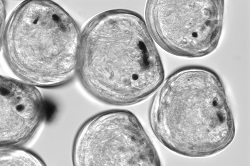Lethal genetic interaction studied in plant
Natural genetic variation within populations largely determines phenotypic variation and is increasingly recognised as a critical factor in such diverse contexts as crop productivity or human disease susceptibility. EU-funded scientists have succeeded in explaining the extent and nature of deleterious genetic interactions. In the extreme, such genetic interactions can lead to hybrid sterility or breakdown, processes which are thought to drive reproductive isolation and thus initiate speciation; hence the importance of this study, according to the research team. Via the NATSYNTHLETHALARA project, researchers achieved their result by genetic mapping. To this end, they applied 'state-of-the-art high throughput technologies', such as multiplex genotyping or whole genome sequencing. 'The genetic riddle posed by the genotyping and sequence data acquired was eventually resolved through careful analysis of the hybrid and parental lines in different growth conditions,' explained the study team. They said that in addition, the project had created 'various useful resources, such as whole genome sequences of natural Arabidopsis strains'.







